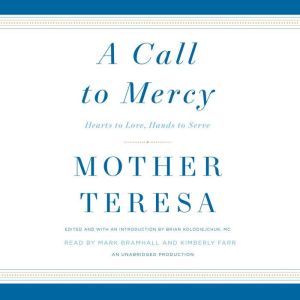
List: $20.00
| Sale: $14.00
Club: $10.00
A Call to Mercy
Hearts to Love, Hands to Serve
Author: Mother Teresa, Brian Kolodiejchuk, M.C.
Narrator: Mark Bramhall, Kimberly Farr
Unabridged: 10 hr 46 min
Format: Digital Audiobook Download
Publisher: Random House Audio
Published: 08/16/2016
Category: Religion - Christianity - Catholic
Synopsis
Published to coincide with Pope Francis's Year of Mercy and the Vatican's canonization of Mother Teresa, this new book of unpublished material by a humble yet remarkable woman of faith whose influence is felt as deeply today as it was when she was alive, offers Mother Teresa’s profound yet accessible wisdom on how we can show mercy and compassion in our day-to-day lives.
For millions of people from all walks of life, Mother Teresa's canonization is providentially taking place during Pope Francis's Extraordinary Jubilee of Mercy. This is entirely fitting since she is seen both inside and outside of the Church as an icon of God's mercy to those in need.
Compiled and edited by Brian Kolodiejckuk, M.C., the postulator of Mother Teresa’s cause for sainthood, A Call to Mercy presents deep yet accessible wisdom on how we can show compassion in our everyday lives. In her own words, Mother Teresa discusses such topics
as:
the need for us to visit the sick and the imprisoned
the importance of honoring the dead and informing the ignorant
the necessity to bear our burdens patiently and forgive willingly
the purpose to feed the poor and pray for all
the greatness of creating a “civilization of love” through personal service to others
Featuring never before published testimonials by people close to Mother Teresa as well as prayers and suggestions for putting these ideas into practice, A Call to Mercy is not only a lovely keepsake, but a living testament to the teachings of a saint whose ideas are important, relevant and very necessary in the 21st century.
For millions of people from all walks of life, Mother Teresa's canonization is providentially taking place during Pope Francis's Extraordinary Jubilee of Mercy. This is entirely fitting since she is seen both inside and outside of the Church as an icon of God's mercy to those in need.
Compiled and edited by Brian Kolodiejckuk, M.C., the postulator of Mother Teresa’s cause for sainthood, A Call to Mercy presents deep yet accessible wisdom on how we can show compassion in our everyday lives. In her own words, Mother Teresa discusses such topics
as:
the need for us to visit the sick and the imprisoned
the importance of honoring the dead and informing the ignorant
the necessity to bear our burdens patiently and forgive willingly
the purpose to feed the poor and pray for all
the greatness of creating a “civilization of love” through personal service to others
Featuring never before published testimonials by people close to Mother Teresa as well as prayers and suggestions for putting these ideas into practice, A Call to Mercy is not only a lovely keepsake, but a living testament to the teachings of a saint whose ideas are important, relevant and very necessary in the 21st century.